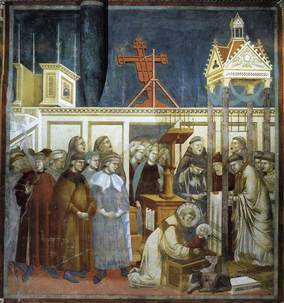Just prior to Christmas Pope Benedict XVI reflected on
Saint Francis of Assisi's gift to the Church in 1223 of the Nativity scene.
Then, as now we see Humility, Jesus, encountering the nihilism of the world, a
people who entranced with violence and anger now faced with the Prince of
Peace, the true king of the universe.
In homes and Churches across the world it is typical to see a Nativity scene prepared. Over the years my family has had a small nativity scene present in our home. It is not a great piece of art and it is not something we've done historically, but it is something that is now a regular part of our Christmas decorations. In fact, it is left out throughout the year as I move it around the house as a small reminder of the God becoming one of us.

But let's not forget that a Nativity scene and Christmas tree is not that old of a tradition for St. Peter's Square. John Paul II made the Nativity scene in St Peter's Square a priority in 1982 because he felt the world needed to encounter the image of God made man, Jesus, the Eternal Word of God come into our humanity history. Thinking that the crèche still had relevance for the modern person in 2004, John Paul said of the Nativity scene,
Christmas is upon us and in many places people are setting up a crèche, like here in St Peter's. Whether big or small, fancy or simple, the crèche is a familiar and expressive representation of Christmas. It is part of our culture and art but a sign of faith in God who, in Bethlehem, 'made his dwelling among us (Jn 1:14). As I do every year, I shall bless the "Bambinelli," the statues of Baby Jesus. which will be placed in the crèche on Holy Night, joining Joseph and Mary, who are silent witnesses of a sublime Mystery. With loving eyes, they tell us to wait and pray in order to welcome the Divine Savior who is coming to bring the world the joy of Christmas.
Pope Benedict speaks about Saint Francis' gift of the Crib

With St. Francis and his
nativity, the defenseless love of God was shown, his humility and goodness,
which in the incarnation of the Word is manifested to man so as to teach a new
way to live and to love. He saw a little child lying still in a manger; the
child woke up because Francis approached... 'This vision was not different than
real life, since through the work of his grace acting by way of his holy
servant Francis, the Child Jesus was resurrected in the hearts of many. Thanks
to St. Francis, the Christian people have been able to perceive that at
Christmas, God truly has become Emmanuel, God-with-us, from whom no barrier or
distance can separate us. In this Child, God has come so near to each one of
us, so close, that we can address him with confidence and maintain with him a
trusting relationship of deep affection, as we do with a newborn. In this
Child, in fact, God-Love is manifested: God comes without weapons, without
strength, because he does not aim to conquer, we could say, from without, but
rather wants to be welcomed by man in liberty. God becomes a defenseless Child to
conquer man's pride, violence and desire to possess. In Jesus, God took up this
poor and defenseless condition to conquer with love and lead us to our true
identity ... so that he concedes to our hearts this simplicity that recognizes
the Lord in this Child, precisely as Francis did in Greccio. Then, we too can
experience what [...] happened to those present [...] 'Each one returned to his
house filled with an ineffable joy.


Leave a comment